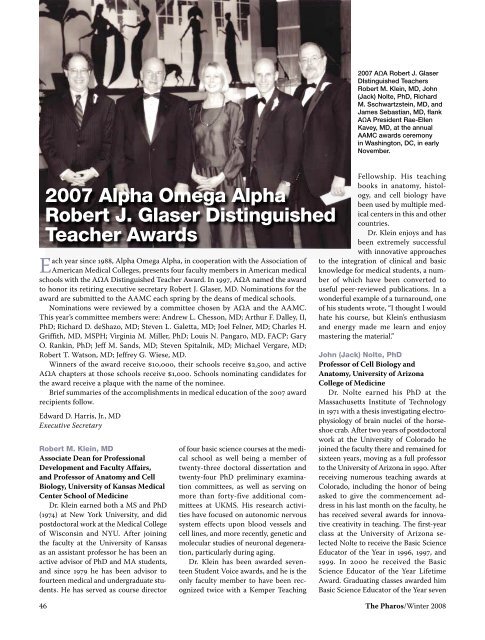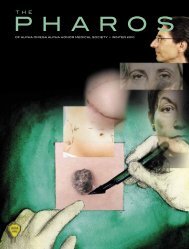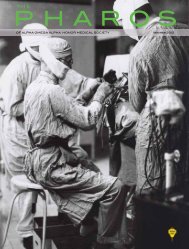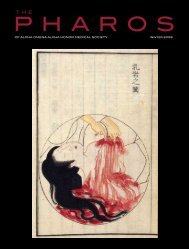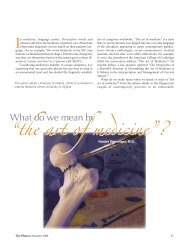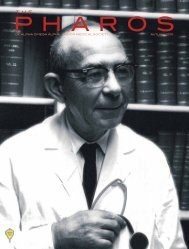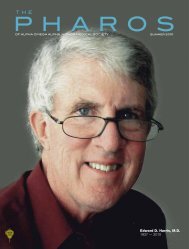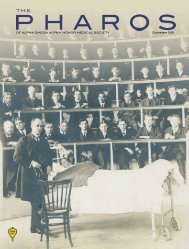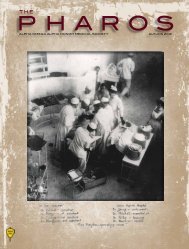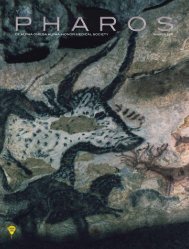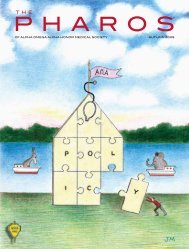Download The Pharos Winter 2008 Edition - Alpha Omega Alpha
Download The Pharos Winter 2008 Edition - Alpha Omega Alpha
Download The Pharos Winter 2008 Edition - Alpha Omega Alpha
Create successful ePaper yourself
Turn your PDF publications into a flip-book with our unique Google optimized e-Paper software.
2007 AΩA Robert J. Glaser<br />
DIstinguished Teachers<br />
Robert M. Klein, MD, John<br />
(Jack) Nolte, PhD, Richard<br />
M. Sschwartzstein, MD, and<br />
James Sebastian, MD, flank<br />
AΩA President Rae-Ellen<br />
Kavey, MD, at the annual<br />
AAMC awards ceremony<br />
in Washington, DC, in early<br />
November.<br />
2007 <strong>Alpha</strong> <strong>Omega</strong> <strong>Alpha</strong><br />
Robert J. Glaser Distinguished<br />
Teacher Awards<br />
Each year since 1988, <strong>Alpha</strong> <strong>Omega</strong> <strong>Alpha</strong>, in cooperation with the Association of<br />
American Medical Colleges, presents four faculty members in American medical<br />
schools with the AΩA Distinguished Teacher Award. In 1997, AΩA named the award<br />
to honor its retiring executive secretary Robert J. Glaser, MD. Nominations for the<br />
award are submitted to the AAMC each spring by the deans of medical schools.<br />
Nominations were reviewed by a committee chosen by AΩA and the AAMC.<br />
This year’s committee members were: Andrew L. Chesson, MD; Arthur F. Dalley, II,<br />
PhD; Richard D. deShazo, MD; Steven L. Galetta, MD; Joel Felner, MD; Charles H.<br />
Griffith, MD, MSPH; Virginia M. Miller, PhD; Louis N. Pangaro, MD, FACP; Gary<br />
O. Rankin, PhD; Jeff M. Sands, MD; Steven Spitalnik, MD; Michael Vergare, MD;<br />
Robert T. Watson, MD; Jeffrey G. Wiese, MD.<br />
Winners of the award receive $10,000, their schools receive $2,500, and active<br />
AΩA chapters at those schools receive $1,000. Schools nominating candidates for<br />
the award receive a plaque with the name of the nominee.<br />
Brief summaries of the accomplishments in medical education of the 2007 award<br />
recipients follow.<br />
Edward D. Harris, Jr., MD<br />
Executive Secretary<br />
Robert M. Klein, MD<br />
Associate Dean for Professional<br />
Development and Faculty Affairs,<br />
and Professor of Anatomy and Cell<br />
Biology, University of Kansas Medical<br />
Center School of Medicine<br />
Dr. Klein earned both a MS and PhD<br />
(1974) at New York University, and did<br />
postdoctoral work at the Medical College<br />
of Wisconsin and NYU. After joining<br />
the faculty at the University of Kansas<br />
as an assistant professor he has been an<br />
active advisor of PhD and MA students,<br />
and since 1979 he has been advisor to<br />
fourteen medical and undergraduate students.<br />
He has served as course director<br />
of four basic science courses at the medical<br />
school as well being a member of<br />
twenty-three doctoral dissertation and<br />
twenty-four PhD preliminary examination<br />
committees, as well as serving on<br />
more than forty-five additional committees<br />
at UKMS. His research activities<br />
have focused on autonomic nervous<br />
system effects upon blood vessels and<br />
cell lines, and more recently, genetic and<br />
molecular studies of neuronal degeneration,<br />
particularly during aging.<br />
Dr. Klein has been awarded seventeen<br />
Student Voice awards, and he is the<br />
only faculty member to have been recognized<br />
twice with a Kemper Teaching<br />
Fellowship. His teaching<br />
books in anatomy, histology,<br />
and cell biology have<br />
been used by multiple medical<br />
centers in this and other<br />
countries.<br />
Dr. Klein enjoys and has<br />
been extremely successful<br />
with innovative approaches<br />
to the integration of clinical and basic<br />
knowledge for medical students, a number<br />
of which have been converted to<br />
useful peer-reviewed publications. In a<br />
wonderful example of a turnaround, one<br />
of his students wrote, “I thought I would<br />
hate his course, but Klein’s enthusiasm<br />
and energy made me learn and enjoy<br />
mastering the material.”<br />
John (Jack) Nolte, PhD<br />
Professor of Cell Biology and<br />
Anatomy, University of Arizona<br />
College of Medicine<br />
Dr. Nolte earned his PhD at the<br />
Massachusetts Institute of Technology<br />
in 1971 with a thesis investigating electrophysiology<br />
of brain nuclei of the horseshoe<br />
crab. After two years of postdoctoral<br />
work at the University of Colorado he<br />
joined the faculty there and remained for<br />
sixteen years, moving as a full professor<br />
to the University of Arizona in 1990. After<br />
receiving numerous teaching awards at<br />
Colorado, including the honor of being<br />
asked to give the commencement address<br />
in his last month on the faculty, he<br />
has received several awards for innovative<br />
creativity in teaching. <strong>The</strong> first-year<br />
class at the University of Arizona selected<br />
Nolte to receive the Basic Science<br />
Educator of the Year in 1996, 1997, and<br />
1999. In 2000 he received the Basic<br />
Science Educator of the Year Lifetime<br />
Award. Graduating classes awarded him<br />
Basic Science Educator of the Year seven<br />
46 <strong>The</strong> <strong>Pharos</strong>/<strong>Winter</strong> <strong>2008</strong>


